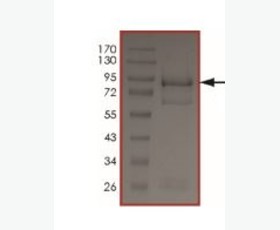Recombinant Human Legumain/Asparaginyl Endopeptidase
| Product name: | Recombinant Human Legumain/Asparaginyl Endopeptidase |
| Source: | Human Cells |
| Purity: | Greater than 95% as determined by reducing SDS-PAGE. |
| Buffer Formulation: | Supplied as a 0.2 μm filtered solution of 20mM TrisHCl, 150mM NaCl, 10% Glycerol, pH 8.0. |
| Applications: | Applications:SDS-PAGE; WB; ELISA; IP. |
| Storage: | Avoid repeated freeze/thaw cycles. Store at 2-8 oC for one month. Aliquot and store at -80 oC for 12 months. |
| UOM: | 100ug/50ug/200ug/1mg/1g |
| Source | Human Cells |
| Description | Recombinant Human Legumain is produced by our Mammalian expression system and the target gene encoding Ile18-Tyr433 is expressed with a 6His tag at the C-terminus. |
| Names | Legumain, Asparaginyl Endopeptidase, Protease Cysteine 1, LGMN, PRSC1 |
| Accession # | Q99538 |
| Formulation | Supplied as a 0.2 μm filtered solution of 20mM TrisHCl, 150mM NaCl, 10% Glycerol, pH 8.0. |
| Shipping |
The product is shipped on dry ice/ice packs. |
| Storage |
Store at < -20°C, stable for 6 months after receipt. Please minimize freeze-thaw cycles. |
| Purity |
Greater than 95% as determined by reducing SDS-PAGE. |
| Endotoxin | Less than 0.1 ng/µg (1 IEU/µg) as determined by LAL test. |
| Amino Acid Sequence |
IPIDDPEDGGKHWVVIVAGSNGWYNYRHQADACHAYQIIHRNGIPDEQIVVMMYDDIAYSEDNPT PGIVINRPNGTDVYQGVPKDYTGEDVTPQNFLAVLRGDAEAVKGIGSGKVLKSGPQDHVFIYFTD HGSTGILVFPNEDLHVKDLNETIHYMYKHKMYRKMVFYIEACESGSMMNHLPDNINVYATTAANP RESSYACYYDEKRSTYLGDWYSVNWMEDSDVEDLTKETLHKQYHLVKSHTNTSHVMQYGNKTIST MKVMQFQGMKRKASSPVPLPPVTHLDLTPSPDVPLTIMKRKLMNTNDLEESRQLTEEIQRHLDAR HLIEKSVRKIVSLLAASEAEVEQLLSERAPLTGHSCYPEALLHFRTHCFNWHSPTYEYALRHLYV LVNLCEKPYPLHRIKLSMDHVCLGHYVDHHHHHH
|
| Background | Legumain is a lysosomal cysteine protease which is a member of the peptidase C13 family. Though it is found in many tissues, it is highly expressed in the kidney, heart, and placenta. Legumain has a strict specificity for hydrolysis of asparaginyl bonds and can also cleave aspartyl bonds slowly, especially under acidic conditions. Over-expression Legumain in tumors is significant for invasion and metastasis. In addition, Legumain may be involved in the processing of proteins for MHC class II antigen presentation in the lysosomal/endosomal system and negative regulation of neuron apoptosis. |
| References |
A novel legumain protease-activated micelle cargo enhances anticancer activity and cellular internalization of doxorubicin |














